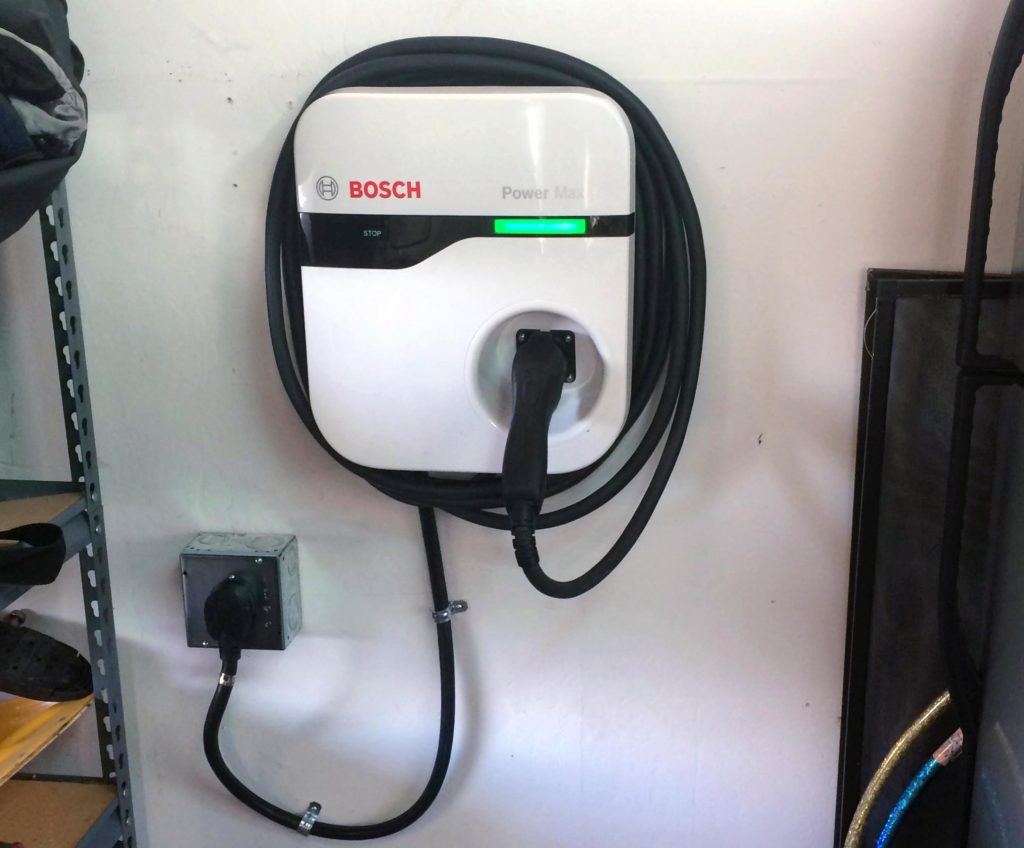
The demand for residential EV charging stations has skyrocketed in recent years. Photo: Got Watts Electric & Solar ©2019
In recent years, you’ve likely noticed the proliferation of electric vehicle (EV) charging stations at shopping centers, commercial workspaces and other public places. However, did you know EV charging stations are also increasing in prevalence as a residential feature? To learn more about residential EV charging stations, we spoke to Shelby Kromer of Got Watts Electric & Solar in Pleasant Hill.
EV charging stations on the rise
It would be easy for one to miss the current boom in residential EV charger installations—after all, unlike public charging stations, these are often tucked away in garages. In any case, Ms. Kromer confirms that the demand for charging stations has skyrocketed during the last few years. “Based on our company’s own numbers, from 2015 to 2018, we saw a 379 percent increase in EV charger installations, the vast majority of which were residential. Based on our 2019 numbers so far, I project this increase is going to continue for the foreseeable future.”
The rising demand for residential EV chargers should come as no surprise—it merely parallels the growing popularity of electric vehicles. “As vehicle manufacturers come out with more affordable EV options, it becomes a lot easier for the average person to purchase one. And since all these people need to charge their vehicles, it makes sense that we’re seeing a higher demand for residential installations.”
The basics of EV charger installation
While EV charger installation isn’t always cut and dry, there are some basic parameters that form the groundwork. Ms. Kromer addresses these by answering the following questions:
Diamond Certified Resource: How much does an EV charging station cost?
Shelby Kromer: The cost mainly depends on the distance between the electrical panel and the installation site. If we’re installing right next to the panel, the cost might be around $600, plus permitting and inspections. If we have to route it from one side of the garage to the other, it’s going to be more in the $1,000 to $1,200 range. Of course, this is assuming the electrical panel doesn’t require a service upgrade. (More on this later.)
DCR: How long does installation take to complete?
SK: As with price, the time frame of installation varies depending on how complex it is. If it’s a simple installation that’s a short distance from the panel, it can usually be done in a couple of hours, whereas more complicated installations can take an entire day. It’s rare for an installation to take more than a day.
DCR: Is a permit required for installation?
SK: Yes. The time frame and cost for permits varies depending on your city or county. In most cases, you can get a permit same-day, but the price can range anywhere from $80 to $250.
DCR: Do I have to install my EV charging station in my garage?
SK: No. While most of our customers choose to install in the garage, we’ve also installed charging stations outside, whether in a car port or on a pedestal down the driveway.
A costly outlier

Due to their large batteries, Tesla EVs require more amperage to charge than most other brands. Photo: Got Watts Electric & Solar ©2019
While an EV charging station can often be installed for a reasonable cost, under certain circumstances it can get a lot more expensive. As Ms. Kromer explains, the major determining factor is the load capacity of the home’s electrical panel. “In most cases, if you have a 200-amp service panel, we can add an EV circuit—that is, as long as you aren’t powering a bunch of other things, like a hot tub and central air conditioning. On the other hand, if your electrical panel can’t handle the addition of an EV charging station, it’s going to need a service upgrade.”
Unfortunately, the cost of a service upgrade can be triple that of the actual EV charger—and that’s in a best-case scenario. “If your home has overhead service, where the power lines come down from above, the panel upgrade usually takes a day or two and costs about $3,000,” says Ms. Kromer. “However, if you have underground service, this will require PG&E engineering, which is going to bring the price up quite a bit.”
Fortunately for homeowners who can’t afford a service upgrade, Ms. Kromer says there’s an alternative option. “If a service upgrade isn’t doable for the homeowner, another option is to de-rate the charging station so it pulls a bit less amperage. The downside is that it’ll take longer to charge the vehicle, but if you don’t mind the inconvenience, it can make the cost of installing an EV charger a lot more feasible.”
A savings worth getting charged up about
Compared to the price of gas, the cost to charge an electric vehicle is more than reasonable. For example, charging a Tesla Model 3 costs roughly $6.44 per kilowatt hour, which amounts to $27.32 for a full charge—a little more than half the cost of a fuel pump fill-up. It doesn’t take a mathematician to deduce that this difference can translate to significant long-term savings, which makes a residential EV charging station a wise investment.
Want to save even more money? Consider installing a solar energy system. After all, there’s no cheaper way to charge your vehicle than by harnessing the power of the sun. As Ms. Kromer reports, one company has already developed a solar innovation that’s specifically geared toward electric vehicles. “SolarEdge has a solar inverter that’s equipped with a built-in EV charger. During the daylight hours, when your vehicle is charging, this inverter will actually bypass the panel and grid and push power directly to the EV charger. Unfortunately, it doesn’t work at night, but if you have the opportunity to charge your vehicle in the daytime, it’s a nice feature. In any case, a solar energy system can save you a lot on EV charging because you’re pulling energy from the sun instead of from the grid.”
